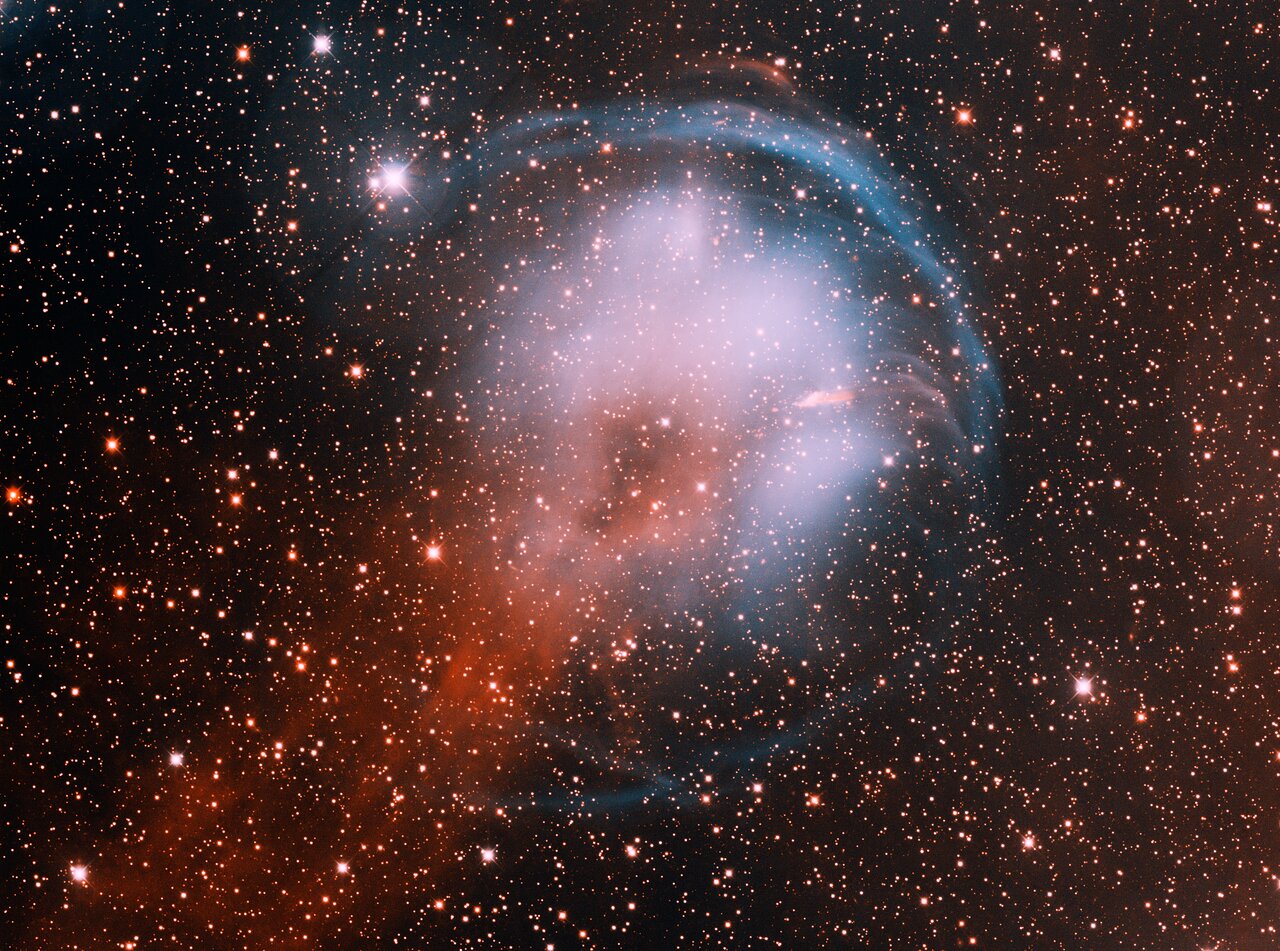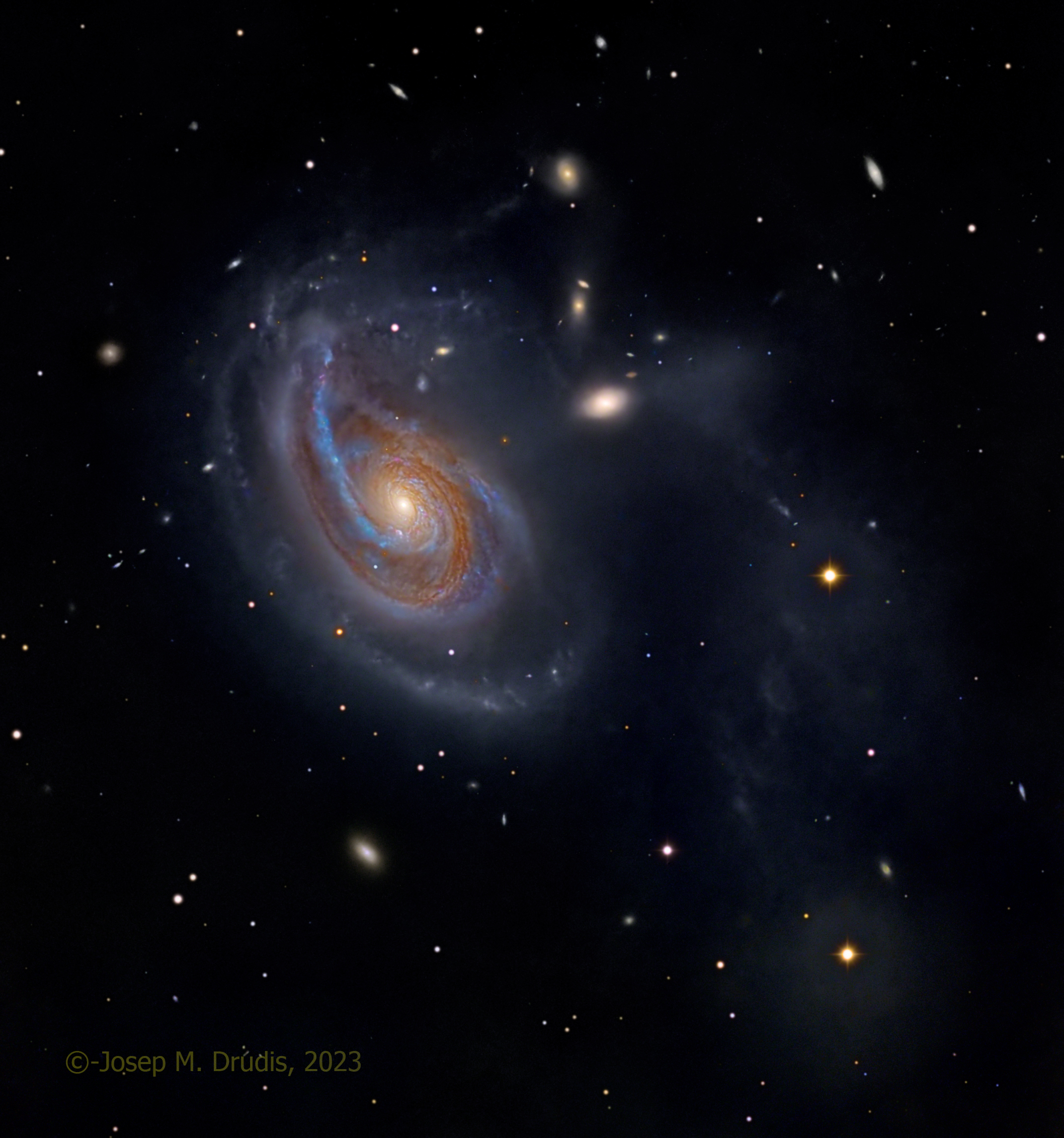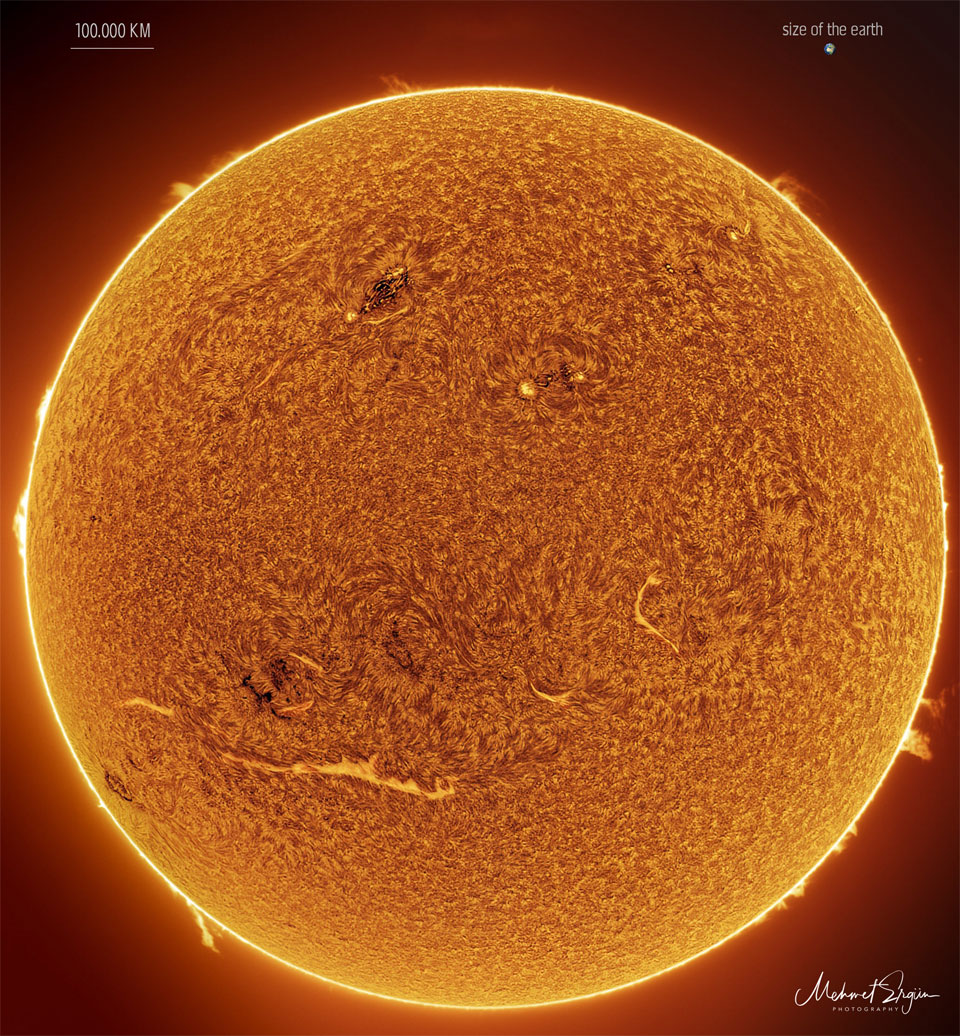Blog
Antoine Dominique Domino Jr. (February 26, 1928 – October 24, 2017), known as Fats Domino, was an American pianist, singer and songwriter. One of the pioneers of rock and roll music, Domino sold more than 65 million records. Born in New Orleans to a French Creolefamily, Domino signed to Imperial Records in 1949. His first single “The Fat Man” is cited by some historians as the first rock and roll single and the first to sell more than 1 million copies. Domino continued to work with the song’s co-writer Dave Bartholomew, contributing his distinctive rolling piano style to Lloyd Price‘s “Lawdy Miss Clawdy” (1952) and scoring a string of mainstream hits beginning with “Ain’t That a Shame” (1955). Between 1955 and 1960, he had eleven Top 10 US pop hits. By 1955, five of his records had sold more than a million copies, being certified gold.
more...This image was obtained with the wide-field view of the Mosaic camera on the Mayall 4-meter telescope at Kitt Peak National Observatory. HFG1 is a planetary nebula in the constellation of Cassiopeia. It was produced by a binary star system (V664 Cas) that is moving rapidly through our Galaxy. The star is moving towards the upper-right of the image. As HFG1 plows through the interstellar medium, a bluish bowshock is produced; and a red trail of gas is left behind in its wake. The image was generated with observations in the Hydrogen alpha (red) and Oxygen [OIII] (blue) filters. In this image, North is down and East is to the right.

more...
René Thomas (25 February 1927 – 3 January 1975) was a Belgian jazz guitarist.
In the early 1950s, he moved to Paris, France, and became part of the modern jazz scene, playing in the style of Jimmy Raney. He spent brief periods in the United States from 1958 to 1962. Back in Europe, he toured and recorded with Chet Baker, Bobby Jaspar, Kenny Clarke, Eddy Louiss, Stan Getz, Lucky Thompson, Sonny Criss, Jacques Pelzer, Lou Bennett, Charles “Lolo” Bellonzi, and Ingfried Hoffmann.
Thomas died of a heart attack in Santander, Spain, at the age of 47 on 3 January 1975.
more...Ida Cox (born Ida M. Prather, February 26, 1888 or 1896 – November 10, 1967) was an American singer and vaudeville performer, best known for her blues performances and recordings. She was billed as “The Uncrowned Queen of the Blues”.
Cox was born Ida M. Prather, the daughter of Lamax and Susie (Knight) Prather in Toccoa, then Habersham County, Georgia, and grew up in Cedartown, Polk County, Georgia. Many sources give her birth date as February 26, 1896, but the researchers Bob Eagle and Eric LeBlanc have suggested she was born in 1888 and noted other evidence suggesting 1894. Her family lived and worked in the shadow of the Riverside Plantation, the private residence of the wealthy Prather family, from which her namesake came. She faced a future of poverty and few educational and employment opportunities.
more...George Harrison MBE (25 February 1943 – 29 November 2001) was an English musician and singer-songwriter who achieved international fame as the lead guitarist of the Beatles. Sometimes called “the quiet Beatle”, Harrison embraced Indian culture and helped broaden the scope of popular music through his incorporation of Indian instrumentation and Hindu-aligned spirituality in the Beatles’ work. Although the majority of the band’s songs were written by John Lennon and Paul McCartney, most Beatles albums from 1965 onwards contained at least two Harrison compositions. His songs for the group include “Taxman“, “Within You Without You“, “While My Guitar Gently Weeps“, “Here Comes the Sun” and “Something“. Harrison’s earliest musical influences included George Formby and Django Reinhardt; subsequent influences were Carl Perkins, Chet Atkins and Chuck Berry.
By 1965, he had begun to lead the Beatles into folk rock through his interest in Bob Dylan and the Byrds, and towards Indian classical music through his use of Indian instruments, such as sitar, which he had become acquainted with on the set of the movie Help! He played the sitar on numerous Beatles songs, starting with “Norwegian Wood (This Bird Has Flown)“. Having initiated the band’s embracing of Transcendental Meditation in 1967, he subsequently developed an association with the Hare Krishna movement. After the band’s break-up in 1970, Harrison released the triple album All Things Must Pass, a critically acclaimed work that produced his most successful hit single, “My Sweet Lord“, and introduced his signature sound as a solo artist, the slide guitar. He also organised the 1971 Concert for Bangladesh with Indian musician Ravi Shankar, a precursor to later benefit concerts such as Live Aid. In his role as a music and film producer, Harrison produced acts signed to the Beatles’ Apple record label before founding Dark Horse Records in 1974; he co-founded HandMade Films in 1978, initially to produce the Monty Python troupe’s comedy filmThe Life of Brian (1979).
Harrison released several best-selling singles and albums as a solo performer. In 1988, he co-founded the platinum-selling supergroup the Traveling Wilburys. A prolific recording artist, he was featured as a guest guitarist on tracks by Badfinger, Ronnie Wood and Billy Preston, and collaborated on songs and music with Dylan, Eric Clapton, Ringo Starr and Tom Petty, among others. Rolling Stone magazine ranked him number 11 in their list of the “100 Greatest Guitarists of All Time”. He is a two-time Rock and Roll Hall of Fameinductee – as a member of the Beatles in 1988, and posthumously for his solo career in 2004.
Harrison’s first marriage, to model Pattie Boyd in 1966, ended in divorce in 1977. The following year he married Olivia Arias, with whom he had a son, Dhani. Harrison died from lung cancer in 2001 at the age of 58, two years after surviving a knife attack by an intruder at his home, Friar Park. His remains were cremated, and the ashes were scattered according to Hindu tradition in a private ceremony in the Gangesand Yamuna rivers in India. He left an estate of almost £100 million.
more... Peculiar spiral galaxy Arp 78 is found within the boundaries of the head strong constellation Aries. Some 100 million light-years beyond the stars and nebulae of our Milky Way galaxy, the island universe is an enormous 200,000 light-years across.Also known as NGC 772, it sports a prominent, outer spiral arm in this detailed cosmic portrait. Tracking along sweeping dust lanes and lined with young blue star clusters, Arp 78’s overdeveloped spiral arm ispumped-up by galactic-scale gravitational tides. Interactions with its brightest companion galaxy, the more compact NGC 770 seen above and right of the larger spiral, are likely responsible. Embedded in faint star streams revealed in the deep telescopic exposure, NGC 770’s fuzzy, elliptical appearance contrasts nicely with spiky foreground Milky Way stars in matching yellowish hues. 
Nicholas Christian Hopkins (24 February 1944 – 6 September 1994) was an English pianist and organist. Hopkins performed on many popular and enduring British and American rock music recordings from the 1960s to the 1990s, most notably on songs recorded by the Rolling Stones, the Kinks, the Who, the Beatles, the Steve Miller Band, Jefferson Airplane, Rod Stewart, George Harrison, John Lennon, Paul McCartney, Ringo Starr, The Hollies, Cat Stevens, Carly Simon, Harry Nilsson, Joe Walsh, Peter Frampton, Jerry Garcia, Jeff Beck, Joe Cocker, Art Garfunkel, Badfinger, Graham Parker, Gary Moore, and Donovan. He is widely considered to be one of the greatest studio pianists in the history of popular rock music. Hopkins died on 6 September 1994, at the age of 50, in Nashville, Tennessee, from complications resulting from intestinal surgery related to his lifelong battle with Crohn’s disease.
more...Edwin Leon Chamblee (February 24, 1920 – May 1, 1999), known as Eddie “Long Gone” Chamblee, was an American tenor and alto saxophonist, and occasional vocalist, who played jazz and R&B.
more...David “Fathead” Newman(February 24, 1933 – January 20, 2009) was an American jazz and rhythm-and-blues saxophonist, who made numerous recordings as a session musician and leader, but is best known for his work as a sideman on seminal 1950s and early 1960s recordings by Ray Charles.
more...Before a letra a Tangos may open with a guitar falseta or an estribillo, in which the singer sings a traditional melody with nonsense syllables (“le le le, ni, ni, etc.). The estribillo may return throughout the piece as a chorus after a letra.
Once the letra begins it can be broken up several times with remates performed by the dancer. This usually occurs between the first and second line of the letra, and often occurs more frequently, giving the dance a improvisatory air.
more...John Dawson Winter III (February 23, 1944 – July 16, 2014) was an American singer and guitarist. Winter was known for his high-energy blues rock albums and live performances in the late 1960s and 1970s. He also produced three Grammy Award-winning albums for blues singer and guitarist Muddy Waters. After his time with Waters, Winter recorded several Grammy-nominated blues albums. In 1988, he was inducted into the Blues Foundation Hall of Fame and in 2003, he was ranked 63rd in Rolling Stone magazine’s list of the “10.
more...
Only two years ago, the Sun was emerging from a solar minimum so quiet that months would go by without even a single sunspot. In contrast, already this year and well ahead of schedule, our Sun is unusually active, already nearing solar activity levels seen a decade ago during the last solar maximum. Our increasingly active Sun was captured two weeks ago sporting numerous interestingfeatures. The image was recorded in a single color of light called Hydrogen Alpha, color-inverted, and false colored. Spicules carpet much of the Sun’s face. The brightening towards the Sun’s edges is caused by increased absorption of relatively cool solar gas and called limb darkening. Just outside the Sun’s disk, several scintillating prominences protrude, while prominences on the Sun’s face are known as filaments and show as light streaks. Magnetically tangled active regions are both dark and light and contain cool sunspots. As our Sun’s magnetic field winds toward solar maximum over the next few years, whether the Sun’s high activity will continue to increase is unknown.

Joseph Benjamin Wilder (February 22, 1922 – May 9, 2014) was an American jazz trumpeter, bandleader, and composer.
Wilder was awarded the Temple University Jazz Master’s Hall of Fame Award in 2006. The National Endowment for the Arts honored him with its highest honor in jazz, the NEA Jazz Masters Award for 2008.
Wilder was born into a musical family led by his father Curtis, a bassist and bandleader in Philadelphia. Wilder’s first performances took place on the radio program “Parisian Tailor’s Colored Kiddies of the Air”. He and the other young musicians were backed up by such illustrious bands as Duke Ellington‘s and Louis Armstrong‘s that were also then playing at the Lincoln Theater. Wilder studied at the Mastbaum School of Music in Philadelphia, but turned to jazz when he felt that there was little future for an African-American classical musician. At the age of 19, Wilder joined his first touring big band, Les Hite’s band.
more...More Posts
- Echos of Freedom with Maya Angelou
- The Cosmos with NGC 5963/5965
- Benny Golson Day
- Antonio Carlos Jobim Day
- Sleepy John Estes Day
- World Music with El Indio Gitano
- Daily Roots with the Harmonians
- Echos of Freedom by Nina Simone
- The Cosmos with M51
- Joe Albany Day
- Jimmy Forrest Day
- Avery Parrish Day
- Oliver “Tuku” Mtukudzi Day
- Daily Roots with the Soul Rhythms
- Echos of Freedom by Lincoln
- The Cosmos with the Moon Meteorite Strike
- Gary Burton Day
- Curtis Counce Day
- Django Reinhardt Day
- World Music with Hussein Rassim